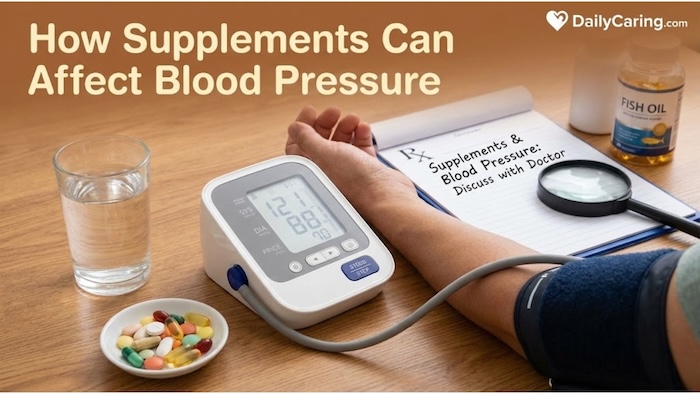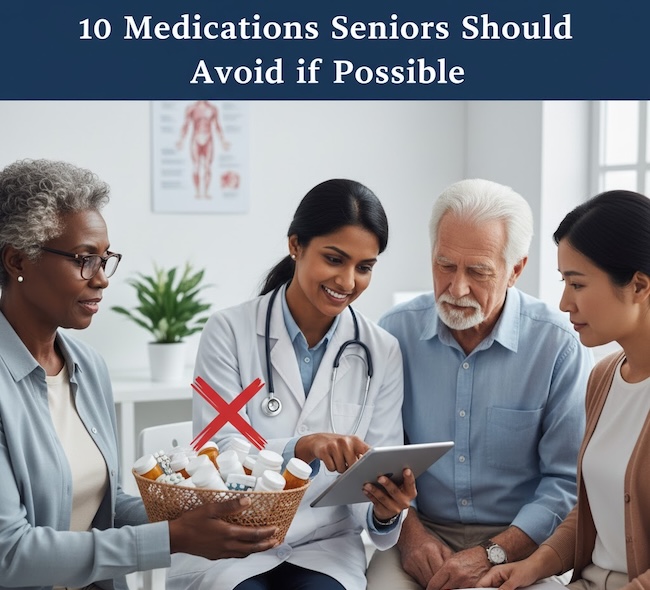Many seniors take vitamins and supplements without realizing they can cause adverse effects. BuzzRx explains which supplements cause negative interactions with common medications – including medications for blood pressure or heart issues.

Many Seniors Take Supplements, But Are They Safe?
If supplements are part of a loved one’s daily routine, they aren’t alone. According to the CDC, it’s estimated that more than 57% of American adults actively take supplements.
Use of dietary supplements also increases with age: approximately 80% of women and 67% of men over 60 take them.
Supplements offer many benefits that complement nutrition obtained through diet. But they aren’t medications.
For example, doctors don’t recommend relying on dietary supplements to treat high blood pressure.
We explain what supplements are, how to identify high-quality supplements, and which supplements can cause adverse interactions with standard medications, including those for blood pressure or heart conditions.
What Are Supplements?
Supplements are an umbrella term for a group of nutrients, including vitamins, minerals, herbs, and botanicals.
Supplements come in various forms, such as liquids, tablets, powders, etc.
Their purpose is to enhance what you already absorb from your diet, as some diets may lack essential nutrients.
However, like over-the-counter and prescription medications, it’s always best to ask a doctor or pharmacist about potential interactions before incorporating a new supplement into a loved one’s routine.
In addition, before a loved one starts a new medication, it’s important to ask a healthcare professional whether it will interact with any supplements they are already taking.
How to Find Safe, High-Quality Supplements
Supermarket shelves are crammed with products that promise a variety of health benefits.
It can be confusing to separate the wheat from the chaff and determine what truly supports a healthier lifestyle and what’s simply a marketing gimmick.
You should ensure your loved one is taking a supplement verified by a reputable third party, as the U.S. Food and Drug Administration (FDA) does not regulate supplements.
Quality brands are those that ConsumerLab, the USP, or NSF International have verified.
These organizations test supplements and confirm that the bottle contains what the label says. Look for these labels when shopping.
In addition, it’s important to note that most supplements are effective only within a specific timeframe. This is usually two years from the date of manufacture.
Be sure to check the expiration date on any product before taking it. Taking expired vitamins may reduce effectiveness because they degrade over time.
Supplements Can Interact Negatively with Certain Medications
It’s a common misconception that supplements can’t cause interactions because they come from natural sources and are readily available over the counter.
It might be more top of mind to ask a doctor about medication interactions. Still, it’s important to ask about supplements, as many can interact with medications, including blood pressure medications.
The American College of Cardiology estimates that approximately 70% of U.S. adults 65 and older have high blood pressure.
When it comes to monitoring blood pressure, some supplements may raise it, and others can interact with blood pressure medication, reducing its effectiveness.
Since no federal agencies regulate supplements, there is generally less information available about adverse effects.
That’s why it’s essential to make sure that a doctor and pharmacist are aware of any supplements that a loved one you are caring for is taking.
Do Vitamins Affect Blood Pressure or Heart Issues?
It’s important to remember that supplements are not synonymous with vitamins.
Vitamins are supplements, and not all supplements interact with blood pressure medications.
At this time, research indicates that no vitamins cause high blood pressure.
Taking supplements of vitamins A, B, C, D, E, and K has not been shown to raise blood pressure.
This is excellent news for older Americans, as 37% of people over 60 are believed to take vitamin D, and 12% are believed to take vitamin B12.
It is also safe to take dietary supplements that include vitamins, such as multivitamins, if you have high blood pressure. Multivitamins, such as Men One-A-Day or Women One-A-Day, have also not been shown to increase the short-term or long-term risk of developing high blood pressure.
However, it is essential to note that vitamins can interact with medications used to treat heart conditions.
For example, if you take a medication to prevent blood clotting (e.g., Warfarin), specific vitamins can interact with it.
An example is vitamin K, which reduces the effectiveness of Warfarin.
Another example is Vitamin E, which may interact with Beta-blockers by affecting their absorption. Beta-blockers are used to treat high blood pressure.
Do Mineral Supplements Affect Blood Pressure?
ACE (angiotensin-converting enzyme) inhibitors, beta-blockers, and angiotensin II receptor blockers (ARBs), which treat high blood pressure, may increase blood potassium levels by blocking aldosterone.
Aldosterone is a hormone that promotes potassium excretion in the urine.
Therefore, if you take any of these medications, you should avoid potassium supplements.
While all three medications can cause high blood potassium levels, the risk is lower with beta-blockers than with ACE inhibitors or angiotensin II receptor blockers (ARBs). ACE inhibitors or ARBs are often prescribed with beta-blockers.
Therefore, you should be mindful of your potassium intake if you are on this combination of medications.
Potassium is a mineral that helps regulate nerve and muscle function, but too much potassium can lead to a dangerous condition called hyperkalemia. Warning signs include heart palpitations, shortness of breath, chest pain, nausea, or vomiting.
People taking medications to treat high blood pressure should consult their doctor before taking potassium supplements to avoid dangerous potassium levels.
Do Herbal Supplements Affect Blood Pressure?
Just because herbal supplements are derived from natural sources doesn’t guarantee that they are safe to consume.
Adverse effects may offset any potential benefits from these supplements.
Certain herbal supplements can affect systolic and diastolic blood pressure, the upper and lower numbers of your blood pressure reading, respectively.
These include:
- Licorice (Glycyrrhiza glabra)
- Guarana (Paullinia cupana)
- Ginseng (Panax ginseng and Panax quinquefolius)
- Arnica (Arnica montana)
- Ephedra (ma-huang)
In addition, herbal supplements can interact with blood pressure medications, such as beta-blockers and calcium channel blockers.
Common supplements with potential interactions include:
- Coenzyme Q10
- Danshen
- Evening primrose
- Ginkgo biloba
- Ginseng
- Hawthorn
- Licorice
- Saw palmetto
- St. John's Wort
For those hoping to cure their high blood pressure without prescription medication, there is currently no strong scientific evidence that any supplement can help to lower blood pressure.
Supplements are not a substitute for prescription blood pressure medications or lifestyle changes.
And doctors don’t recommend relying on dietary supplements to treat high blood pressure.
The best way to control your blood pressure is to achieve a healthy weight, reduce sodium intake, follow a heart-healthy diet (DASH), and get regular exercise.
Recommended for you:
- 3 Ways to Get Prescriptions If Prior Authorization for Medication Is Needed
- Simplify Complex Medication Routines with a DIY Pill Board
- 10 Medications Seniors Should Avoid Taking
Guest contributor: HaVy Ngo-Hamilton, Pharm.D, is a Clinical Consultant at BuzzRx. She has experience in both hospital and ambulatory care settings and is passionate about guiding patients toward better health through medication therapy management and lifestyle counseling. She graduated from Auburn University Harrison School of Pharmacy with a Doctor of Pharmacy (Pharm.D.) degree.













